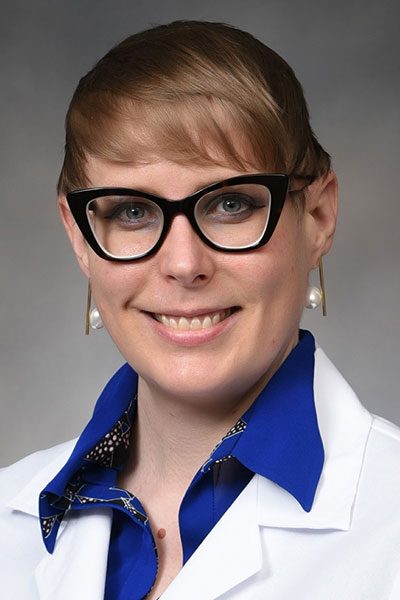The Adult Pulmonary Core Curriculum begins on Sunday, May 19, from 11:30 a.m.–1 p.m. in Ballroom 20B-D (Upper Level) of the San Diego Convention Center. The second session on Monday, May 20, will be held at the same time and location as the first.

In the first session, three presenters will tackle numerous relevant pulmonary care topics, including community-acquired pneumonia, bronchiectasis, and non-tuberculous mycobacterial infections.
Chiagozie Pickens, MD, assistant professor of medicine at Northwestern University, will start the session by presenting, “Put on Your Thinking CAP: The Latest Evidence in Community-Acquired Pneumonia.”
“Community-acquired pneumonia is one of the most common diagnoses among hospitalized patients in the United States, and therapeutic options have changed over time,” explained Erin R. Camac, DO, associate professor of medicine at the University of Kentucky and vice chair of this year’s Pulmonary Core Curriculum. “In 2019, the ATS introduced guidelines for community-acquired pneumonia treatments that some practitioners might not be familiar with. Others might want to be updated about new research since 2019. We’ll cover both in this session.”
Next, Beth Shoshana Zha, MD, PhD, assistant professor at the University of California, San Francisco, will present, “Cough It Up: Infectious Causes and Complications of Bronchiectasis.” Dr. Zha’s presentation will cover the identification, early assessment for complications, and appropriate management of bronchiectasis, itself a common complication associated with other pulmonary illnesses like cystic fibrosis or COPD.
Sunday’s session will wrap with, “Atypical Situation: What’s New in the World of Non-Tuberculosis Mycobacteria,” from Ashley Jane Losier, MD, assistant professor at Yale University.
“Non-tuberculosis mycobacterial infections are becoming more common in the United States, which has resulted in an increased prevalence of atypical bacteria associated with resistance genes,” said Dr. Camac. “Increasingly, general pulmonary medicine doctors are being confronted with complex scenarios which were traditionally the realm of infectious disease experts in the past. Even if we’re not managing these patients ourselves, we need to be prepared to manage the complications of that care from a pulmonary perspective.”
Monday’s session will feature three presentations related to tuberculosis.
“Tuberculosis is a rare illness in the United States, which is very fortunate, but it is a common illness abroad, and co-occurrence with HIV is a deadly co-epidemic across the globe. This epidemiology is constantly changing,” Dr. Camac said. “We’re living in an interconnected world, so when practitioners see patients who were born overseas or who have been traveling, it’s helpful to be informed on the prevalence and epidemiology of the disease in specific regions.”
The first presentation on Monday will be, “The Road Ahead: The Changing Epidemiology of Tuberculosis,” from Jerry Simbarashe Zifodya, MD, MPH, assistant professor at Tulane University. Dr. Zifodya will cover the evolving epidemiology of tuberculosis, identify at-risk populations, and discuss varying strains of the disease, which can be multi-drug resistant.
Dr. Zifodya’s presentation will be followed by “RIPE for the Picking: Updates in the Treatment of Tuberculosis” by Tara Vijayan, MD, clinical associate professor at UCLA. RIPE refers to rifamycin, isoniazid, pyrazinamide, and ethambutol, medications that have been the standard of care for tuberculosis. While tuberculosis does not harbor drug-resistant genes at baseline, the way therapy is administered, along with the guidelines for identifying patients who should receive this therapy, are continuously changing.
“There have been substantial advances in our ability to test for drug-resistant genes in patients with tuberculosis, which can help us tailor appropriate therapies for patients much quicker than we used to,” Dr. Camac added.
Amee S. Patrawalla, MD, MPH, associate professor of medicine at Rutgers University, will close this year’s Pulmonary Core Curriculum with her presentation, “Hiding in Plain Sight: Latent Tuberculosis Screening and Treatment.”
Latent tuberculosis used to be commonly treated with nine months of isoniazid, but more effective and less toxic therapies are now available.
“Many clinicians who underwent training in the past have either not heard of or used these new therapies yet,” Dr. Camac said. “Dr. Patrawalla will walk us through the appropriate patients to screen and treat for latent tuberculosis.”
The core curriculum series aims to support clinicians engaged in Maintenance of Certification (MOC) activities by providing updates on subjects included in recertification requirements. The ATS Clinical Core Curriculum Symposia focuses on key topics in the areas of adult and pediatric pulmonary, critical care, and sleep medicine, which are aligned with corresponding MOC modules. This symposium is intended to help clinicians stay up to date with important information relevant to their medical practices, and provide an opportunity for clinicians to evaluate their knowledge and skills while earning MOC Medical Knowledge points.
This session and the International Conference are supported by an independent medical educational grant from Insmed Incorporated. All CME sessions have been planned and implemented in accordance with the Accreditation Criteria of the Accreditation Council for Continuing Medical Education (ACCME®) and are free of the control of ineligible companies (formerly commercial interests).
Don’t Miss ATS 2024 Highlights: On Demand
Don’t forget that ATS 2024 Highlights: On Demand are available to all conference registrants! On Demand will give you access to the Opening Ceremony, Plenary Session, Keynote Series, Clinical Year in Review, Adult Clinical Core Curriculum, and so much more. The topics will cover ILD, asthma, health equity, and CF, to name just a few. On Demand content will be accessible to all ATS 2024 full conference and On Demand registrants until March 2025.
